Federal vaccine leadership has undergone several changes over the past few months, leading to substantial revisions to vaccine regulation and rhetoric within the federal government. In response to chaos at the federal level, states have begun individually attempting to inform residents on vaccine recommendations and regulate vaccine access.
Robert F. Kennedy Jr., secretary of the U.S. Department of Health and Human Services (HHS), has shaken up the federal government’s vaccine management personnel since the beginning of the summer. In June, Kennedy fired all 17 members of the Advisory Committee on Immunization Practices (ACIP), an advisory committee that develops vaccine recommendations, based on unsubstantiated conflict of interest claims. Kennedy also fired the director of the Centers for Disease Control and Prevention (CDC), leading several other department leaders to resign in protest.
The proposed replacements for ACIP leadership appear to lack substantial backgrounds in the vaccine field, raising concerns among experts, including Dr. Yvonne Maldonado, a former member of the ACIP and pediatrician at Stanford University. Furthermore, Jeffery Koplan, former CDC director, is quoted in NPR, referring to the situation regarding ACIP leadership replacements as “a royal muddle,” full of people “who are not experts in the field.”
Additionally, some government leaders — including Kennedy and Dr. Matthew Memoli, principal deputy director of the National Institutes of Health (NIH) — have begun to eliminate stringent vaccine guidelines from public health recommendations. Without these guidelines, decisions that used to be straightforward for students and for the university become unanswered questions. Where should people look for clear information to make informed vaccination decisions — D.C. public health agencies, home state officials or perhaps non-governmental organizations? What measures should the university take to protect public health on a campus where we all live and work in such close conditions? Will vaccine access remain equitable for students across campus?
Kennedy testified before the U.S. Senate about his role as HHS secretary Sept. 4. During the hearing, Kennedy alleged that only one of the many vaccines required for children in the United States — a figure he estimated to be between 69 and 92 — has undergone clinical trial testing. In reality, of the approximately 20 vaccines required for children, most have been studied in clinical trials with placebos, with the only exceptions being the newest renditions of some vaccines. Meanwhile, NIH whistleblowers have accused Memoli of downplaying the value of vaccines for public health; Memoli allegedly claimed vaccines are not as important as having a “healthy population” when it comes to addressing the highest childhood influenza death toll since 2009.
The added vaccine skepticism in federal leadership comes amid news that the NIH is eliminating many vaccine research projects at universities and adding significant barriers to funding applications for vaccine research. With funding already generally harder to procure for a university’s scientific research efforts, vaccine labs are likely to encounter a series of additional obstacles. For professors who have dedicated their life’s work to vaccine science and students hoping to enter the field, these obstacles are life-threatening.
These changes leave significant questions surrounding what access to vaccination will look like going forward, as both health insurance and access depend on ACIP and other federal recommendations. For Georgetown students, this may look like getting different health care access at home and on campus or seeing different health care access to their family and friends at other universities. Furthermore, the politicization of historically trusted government organizations has drastically reduced clarity in sourcing scientifically accurate public health information, particularly for the average citizen.
State-level leaders are now asking the same questions, with many arriving at radically different conclusions about how to answer them.
California, Oregon and Washington have formed a political alliance on health care charged with making vaccine recommendations based on science, which they believe the federal government has strayed from in favor of political ideology. Eight more states in the Northeast are considering a similar coalition, which includes gaining vaccine access directly from manufacturers instead of going through the federal government. New York and Massachusetts have also taken action, declaring a state of emergency regarding COVID-19 vaccine access and ensuring insurance companies are held responsible for state vaccine recommendations, respectively.
In contrast, Dr. Joseph Ladapo, the surgeon general of Florida, who called vaccines a poison, is working to end vaccine mandates of any kind in the state. Little has come out yet in terms of a plan of action in other Republican-led states. However, Kyle McGowan, former CDC chief of staff, has warned that each state is likely to develop its own unique policy toward vaccines, a trend reminiscent of state approaches to the COVID-19 pandemic. Such partisan policy segregation is raising concerns about consumer confusion which will further segregate the lifestyles of people around party lines, despite the fact that a Washington Post poll from summer 2025 saw 81% of parents nationwide supporting some vaccine mandates for schools, with religious exemptions.
The current state of vaccine access and research is in flux, but as individual states continue to take action, Georgetown students are likely to see friends and peers living in the United States navigate 50 unique sets of vaccine policy and access depending on which state they call home.



